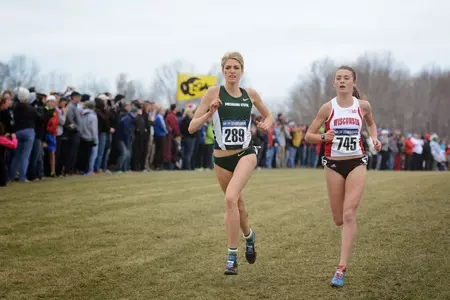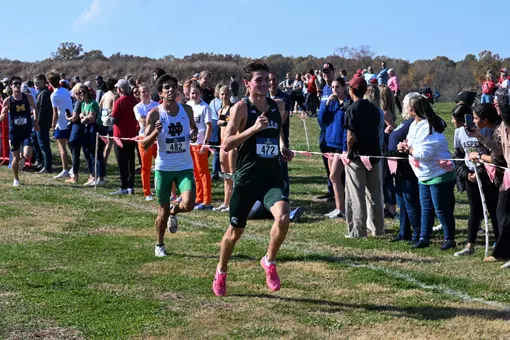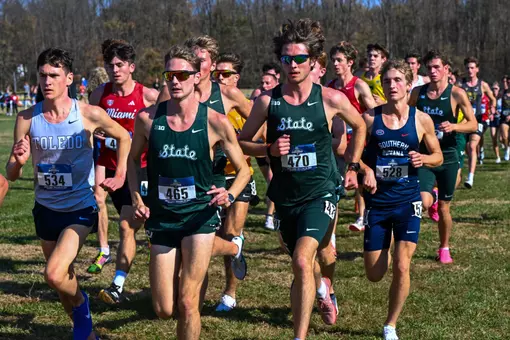Michigan State University Athletics

'Spartan Storm' Evolves Into National Power
11/26/2014 12:00:00 AM | Cross Country

Grinz on Green: 'Spartan Storm' Evolves Into National Power
By Steve Grinczel, MSUSpartans.com Online Columnist | @GrinzOnGreen
EAST LANSING, Mich. - For the past seven years or so, members of the Michigan State women's cross country team have been wearing T-shirts emblazoned with the words, "Spartan Storm."
"They have clouds with lightning coming out them," said Walt Drenth, MSU director of cross country and track & field.
The irony was perfect as the Spartans stormed to the program's first national championship, and the 27th overall in school history, last Saturday in Terre Haute, Indiana.
The imposing front, which produced MSU's first NCAA title since hockey came out of the 2007 Frozen Four on top, started to develop when Leah O'Connor, Julia Otwell, Sara Kroll and Emma Drenth joined the team in 2010.
"The stage for this was probably set when they came in as freshmen," Drenth said of the four fifth-year seniors, including his daughter, who formed the nucleus of the team. "It was a big group of kids. They were great students and they were exceptional athletes, but more importantly, when we were recruiting them it was obvious they were a really cool group of people."
"They were thoughtful, they were leaders on their respective teams and they were really team-first people. We talked to them at camp their freshman year and said, you guys have a chance to make a special mark here. I don't think we defined it any more than that other than we thought if you do the things we ask, if you trust us and let go, it could be pretty good."
The group got off to a good start under the tutelage of then first-year assistant coach Lisa Senakiewich, a 2008 MSU All-American, and Emily MacLeod, who earned Big Ten Cross Country Athlete of the Year and All-America honors in 2010.
"They had great role models and we had some conference champions with Lisa and Nicole Bush (in '09), so they also had phenomenal points of reference," Drenth said. "Then we watched them mature and be inquisitive."
"Being a former athlete here, I've kind of experienced the progress of the program firsthand. We've been able to develop a team that consistently qualifies for nationals and competes at a high level," added Senakiewich. "There was plenty of buildup to get to this point. When I got here, we saw the potential of the young athletes we'd brought in, specifically the fifth-year seniors from this year's team. We thought we had the potential to get back into the top-five at nationals and here we are."
After Michigan State won the Big Ten cross country title a year ago without Otwell and Kroll, who sat out the 2013 season, Drenth planted the seeds for bigger things to come.
"We redshirted Julia and Sara primarily because we promised them they could graduate and run together in their fifth year with the people they came in with," Drenth said. "It was a bit of a risk, and as it turned out, a good one. We won a conference championship without those two and that really allowed us to grow as a program."
"In the tent after the race, I said you learned a really valuable lesson. You can tell when a team is running with apprehension and when they're running all-in. They were fearless and I thought that would allow us to be even better when we came back the following year. We do individual evaluations after the season and then we had a team meeting. I actually didn't say anything about winning but I said, I'm looking at things holistically here, and I think we should just go for it next fall."
"They knew what I was getting at; they sort of made it their mission."
The first hint of what was to come this season became evident when MSU had its best success in track & field under Drenth last spring.
A second straight league cross country crown and the first NCAA championship won by a Michigan State women's team - the Spartan softball team won a national title under the auspices of the Association for Intercollegiate Athletics for Women (AIAW) in 1976 - validated Drenth's premonitions.
Rachele Schulist, a redshirt sophomore, led the way for Michigan State with a fourth-place finish, the best ever by a Spartan at nationals. Redshirt junior Lindsay Clark followed in 11th place and then came the seniors. O'Connor persevered through a tough stretch to finish 17th, Otwell was 21st and Kroll 61st.
"A year ago, we all sat down together and were like, `Why the heck can't we win a national title?' " said O'Connor, the Big Ten women's champion and Cross Country Athlete of the Year. "We all kind of looked at each other like, `Maybe we can.'"
"There are so many factors that play into getting to this point. I think it starts with having a team of people who are close, and that love each other and care about each other. We hold each other accountable, make sure that we stay healthy, make the hard choices and then trust each other. In moments like this, with high stress and a lot of expectation, we go back to the simplicity of, these are my teammates and I'm doing this for them. That gets you through the hardest trials."
Schulist, Clark, O'Connor and Otwell were also named to the All-American team. Each hails from Michigan, as do the vast majority of Drenth's runners.
"We recruited them hard, and of the group Sara Kroll was the most sought-after because she was the most accomplished coming out of high school," Drenth said. "But most of them were not national-level athletes."
The championship is the byproduct of a methodology Drenth brought with him when he joined the MSU athletic staff as the head men's cross country coach and assistant men's track & field coach in 2004.
"One of our teaching points all along is you have to trust the process," he said. "And then, you find out what your best is because you can't stop the race and adjust -- you have to just be your best. I thought we grew the entire year because we came away from every meet adding to the list of what we learned so we could apply it for the next opportunity."
The Spartans also shared a penchant for overachieving with other successful teams on campus.
"As coaches, we have visions of our athletes at their best and often times our vision is greater than their vision of themselves," Drenth said. "It comes down to convincing them they can meet an expectation they may not have imagined."
Cross country has the added dimension of being an individual sport in which competitors are trying to beat their teammates as well as opponents within the context of achieving a team goal.
Drenth said one of the defining moments of the national final occurred when Clark and Otwell caught up to O'Connor, who was struggling.
"Leah wasn't having her best day and at some point, probably around 2,500 or 3,000 meters, she fell off the lead group," he said. "You just have days sometimes when you just don't feel the flow of the run or the stresses are different than normal. You can see in a series of pictures where Julia and Lindsay catch up to her, and at one point she's behind them. But they did their best to get her going, understanding the importance of her success."
"They're like, `Let's go!', and Leah responded to that and dug back into them. That team effort was a big deal emotionally. Sometimes when people lose contact in a big event like that, it can turn into a disaster, but Leah didn't and the outcome was obvious. That was as gratifying as anything."
Michigan State beat second-place Iowa State by 62 points, so it would have won even if O'Connor had finished lower. However, Drenth will make an example of that sequence going forward.
"The belief in each other, that they're going to come through and that they're going to help each other is critical," he said. "They're running fast, and it's hard -- hills, mud, 6,000 meters, almost four miles -- and there's going to be some huge stress points in the race. If it's just about you, it's real easy to go, `It's just not my day.'"
"But when it's about the team and the program, then it's hard to let go of your responsibilities. It wasn't pivotal to winning because of the margin of victory, but it's pivotal to our program. From a teaching standpoint as a coach, I have that as a point of reference. You may be having a bad day, but we have examples of that and how people rallied."
"Coach Senakiewich and I will certainly use that in the future."









